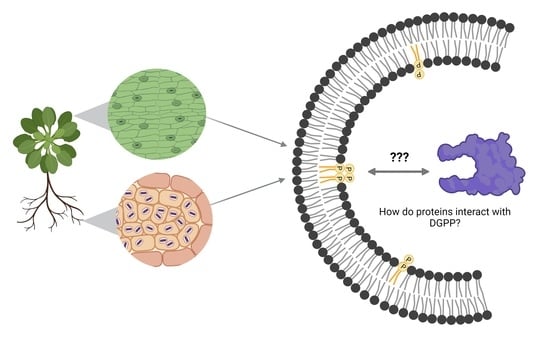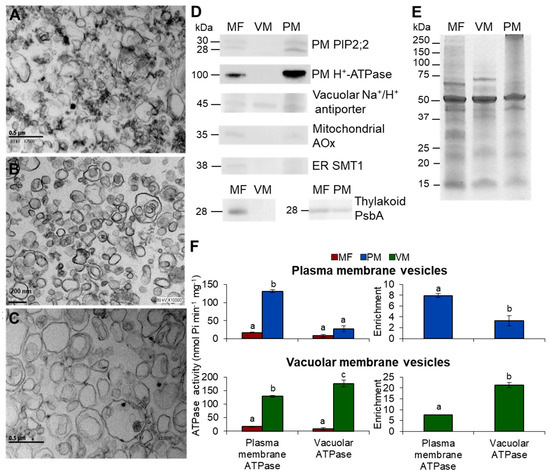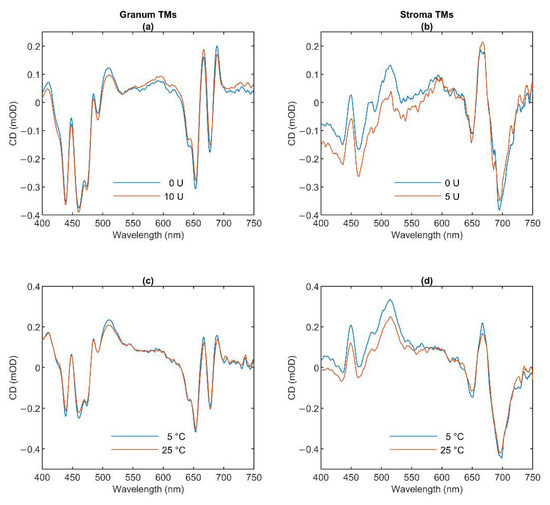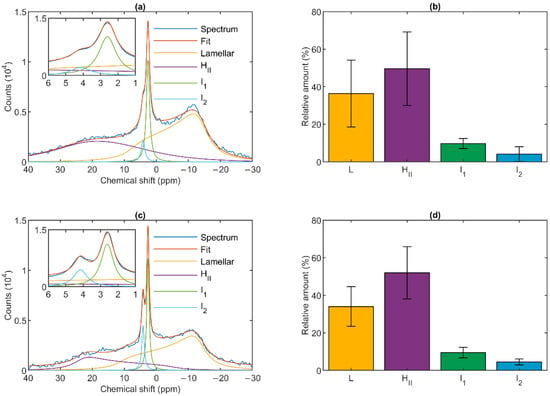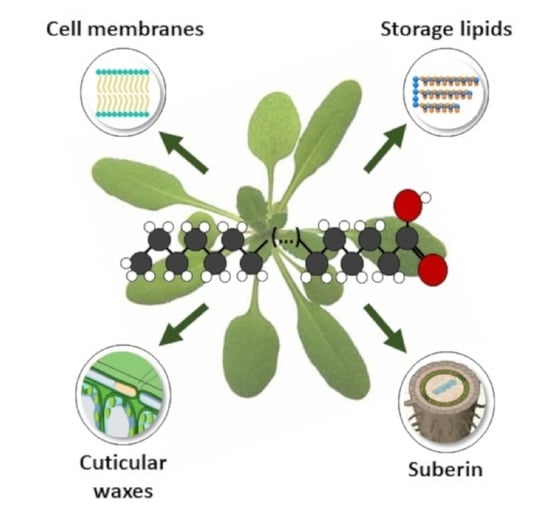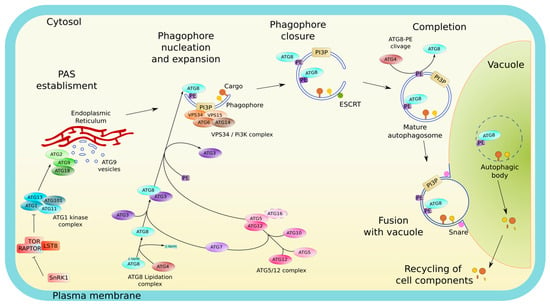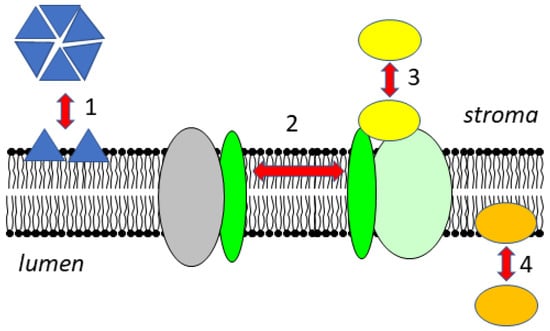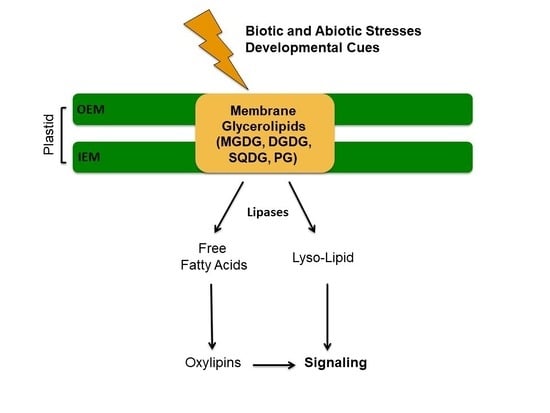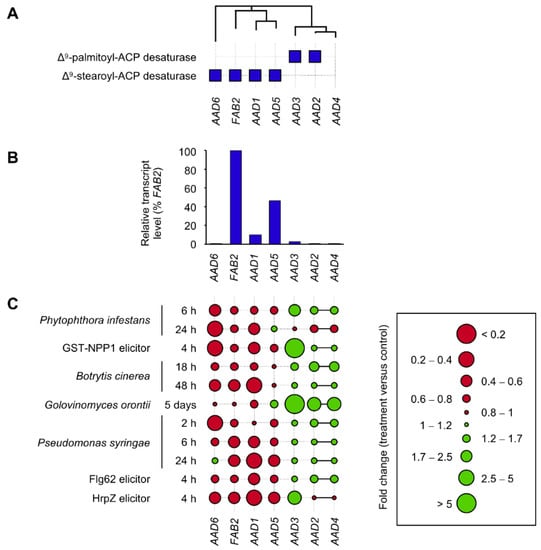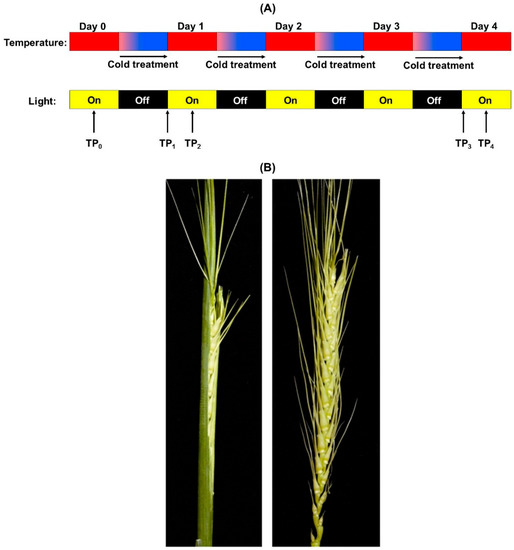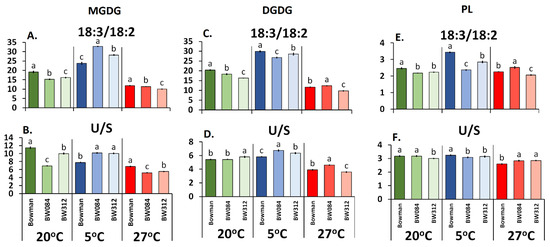Membrane Lipids in the Interaction of Plants with Their Abiotic and Biotic Environment
Share This Topical Collection
Editors
 Dr. Éric Maréchal
Dr. Éric Maréchal
 Dr. Éric Maréchal
Dr. Éric Maréchal
E-Mail
Website
Collection Editor
Laboratoire Physiologie Cellulaire et Végétale, Université Grenoble-Alpes, CNRS, CEA, INRAE; IRIG; 17 rue des Martyrs, 38000 Grenoble, France
Interests: membrane and storage glycerolipids; plants; algae; fatty acids; galactolipids; phospholipids; chloroplasts; endosymbiosis; development; abiotic stress; nutrient availability; biofuels
 Dr. Rebecca Roston
Dr. Rebecca Roston
 Dr. Rebecca Roston
Dr. Rebecca Roston
E-Mail
Website
Collection Editor
University of Nebraska–Lincoln, Biochemistry; 1901 Vine St., N123 Beadle Center, Lincoln, NE 68588, USA
Interests: membrane and storage glycerolipid responses to the environment; galactolipids; lipid structure/function relationships; plastids; development; abiotic stress; redox status; stress signaling; evolution of stress tolerance
Topical Collection Information
Dear Colleagues,
Plants are sessile organisms that have to cope with a tremendous array of abiotic environmental variations, from sudden changes occurring within hours to long-term stresses at seasonal scale. Fixed in the soil, they acclimate reversibly to light intensity and quality variations, such as high UV irradiance; changes in temperatures, such as freezing; exposure to noxious gases and ozone; changes in soil composition, such as acidic pH; lack of phosphorous, nitrogen, or other nutrients; anoxia; excess of water; drought; etc. One of the first modifications occurring in plants subjected to abiotic stresses is a regulation of metabolic pathways and a reprogramming of gene expression controlling the balance between membrane lipid classes, their fatty acid profiles, and their subcellular localization, ending up with a so-called (glycerol)lipid remodeling. Strikingly, membrane lipids are also primordial molecular actors in plant responses to viruses and bacteria, pathogenic or not, and all sorts of biotic interactions. Sphingolipids and sterols are key components of membrane domains acting as functional platforms in biotic interactions. Some viruses and bacteria can divert plant subcellular membranes for their own benefit. Major phyto-hormones activated during biotic stresses include jasmonic acid and other oxylipins deriving from polyunsaturated fatty acids. It is noteworthy that, in various abiotic and biotic interactions, phosphoinositides derived from membrane lipid phosphatidylinositol operate in signaling pathways. To address the impact of climate change on plants, membrane lipids need, therefore, to be closely examined. This Special Issue aims to summarize the current knowledge on the role of membrane lipids and their derivatives in the interaction of plants with their abiotic and biotic environment.
We look forward to your contributions.
Dr. Éric Maréchal
Dr. Rebecca Roston
Guest Editors
Manuscript Submission Information
Manuscripts should be submitted online at www.mdpi.com by registering and logging in to this website. Once you are registered, click here to go to the submission form. Manuscripts can be submitted until the deadline. All submissions that pass pre-check are peer-reviewed. Accepted papers will be published continuously in the journal (as soon as accepted) and will be listed together on the collection website. Research articles, review articles as well as short communications are invited. For planned papers, a title and short abstract (about 250 words) can be sent to the Editorial Office for assessment.
Submitted manuscripts should not have been published previously, nor be under consideration for publication elsewhere (except conference proceedings papers). All manuscripts are thoroughly refereed through a single-blind peer-review process. A guide for authors and other relevant information for submission of manuscripts is available on the Instructions for Authors page. Cells is an international peer-reviewed open access semimonthly journal published by MDPI.
Please visit the Instructions for Authors page before submitting a manuscript.
The Article Processing Charge (APC) for publication in this open access journal is 2700 CHF (Swiss Francs).
Submitted papers should be well formatted and use good English. Authors may use MDPI's
English editing service prior to publication or during author revisions.
Keywords
- glycerolipids
- sphingolipids
- sterols, oxylipins
- phospholipids
- galactolipids
- sulfolipid
- phosphoinositides
- fatty acids
- lipid dynamics
- lipid synthesis
- lipid flux
- lipid degradation
- membrane contact sites
- development
- redistribution
- membrane remodeling
- abiotic stress
- light
- temperature
- nutrients
- biotic stress
- viruses
- pathogenic bacteria
- symbiotic bacteria
- fungi
Published Papers (12 papers)
Open AccessArticle
The Electrostatic Basis of Diacylglycerol Pyrophosphate—Protein Interaction
by
Zachary Graber, Desmond Owusu Kwarteng, Shannon M. Lange, Yannis Koukounas, Hady Khalifa, Jean W. Mutambuze and Edgar E. Kooijman
Cited by 6 | Viewed by 3110
Abstract
Diacylglycerol pyrophosphate (DGPP) is an anionic phospholipid formed in plants, yeast, and parasites under multiple stress stimuli. It is synthesized by the phosphorylation action of phosphatidic acid (PA) kinase on phosphatidic acid, a signaling lipid with multifunctional properties. PA functions in the membrane
[...] Read more.
Diacylglycerol pyrophosphate (DGPP) is an anionic phospholipid formed in plants, yeast, and parasites under multiple stress stimuli. It is synthesized by the phosphorylation action of phosphatidic acid (PA) kinase on phosphatidic acid, a signaling lipid with multifunctional properties. PA functions in the membrane through the interaction of its negatively charged phosphomonoester headgroup with positively charged proteins and ions. DGPP, like PA, can interact electrostatically via the electrostatic-hydrogen bond switch mechanism but differs from PA in its overall charge and shape. The formation of DGPP from PA alters the physicochemical properties as well as the structural dynamics of the membrane. This potentially impacts the molecular and ionic binding of cationic proteins and ions with the DGPP enriched membrane. However, the results of these important interactions in the stress response and in DGPP’s overall intracellular function is unknown. Here, using
31P MAS NMR, we analyze the effect of the interaction of low DGPP concentrations in model membranes with the peptides KALP23 and WALP23, which are flanked by positively charged Lysine and neutral Tryptophan residues, respectively. Our results show a significant effect of KALP23 on the charge of DGPP as compared to WALP23. There was, however, no significant effect on the charge of the phosphomonoester of DGPP due to the interaction with positively charged lipids, dioleoyl trimethylammonium propane (DOTAP) and dioleoyl ethyl-phosphatidylcholine (EtPC). Divalent calcium and magnesium cations induce deprotonation of the DGPP headgroup but showed no noticeable differences on DGPP’s charge. Our results lead to a novel model for DGPP—protein interaction.
Full article
►▼
Show Figures
Open AccessArticle
Plasma Membrane Fluidity: An Environment Thermal Detector in Plants
by
Dora L. Cano-Ramirez, Laura Carmona-Salazar, Francisco Morales-Cedillo, Jorge Ramírez-Salcedo, Edgar B. Cahoon and Marina Gavilanes-Ruíz
Cited by 38 | Viewed by 6606
Abstract
The lipid matrix in cell membranes is a dynamic, bidimensional array of amphipathic molecules exhibiting mesomorphism, which contributes to the membrane fluidity changes in response to temperature fluctuation. As sessile organisms, plants must rapidly and accurately respond to environmental thermal variations. However, mechanisms
[...] Read more.
The lipid matrix in cell membranes is a dynamic, bidimensional array of amphipathic molecules exhibiting mesomorphism, which contributes to the membrane fluidity changes in response to temperature fluctuation. As sessile organisms, plants must rapidly and accurately respond to environmental thermal variations. However, mechanisms underlying temperature perception in plants are poorly understood. We studied the thermal plasticity of membrane fluidity using three fluorescent probes across a temperature range of −5 to 41 °C in isolated microsomal fraction (MF), vacuolar membrane (VM), and plasma membrane (PM) vesicles from Arabidopsis plants. Results showed that PM were highly fluid and exhibited more phase transitions and hysteresis, while VM and MF lacked such attributes. These findings suggest that PM is an important cell hub with the capacity to rapidly undergo fluidity modifications in response to small changes of temperatures in ranges spanning those experienced in natural habitats. PM fluidity behaves as an ideal temperature detector: it is always present, covers the whole cell, responds quickly and with sensitivity to temperature variations, functions with a cell free-energy cost, and it is physically connected with potential thermal signal transducers to elicit a cell response. It is an optimal alternative for temperature detection selected for the plant kingdom.
Full article
►▼
Show Figures
Open AccessArticle
Lipid Polymorphism of the Subchloroplast—Granum and Stroma Thylakoid Membrane–Particles. II. Structure and Functions
by
Ondřej Dlouhý, Václav Karlický, Rameez Arshad, Ottó Zsiros, Ildikó Domonkos, Irena Kurasová, András F. Wacha, Tomas Morosinotto, Attila Bóta, Roman Kouřil, Vladimír Špunda and Győző Garab
Cited by 9 | Viewed by 4102
Abstract
In Part I, by using
31P-NMR spectroscopy, we have shown that isolated granum and stroma thylakoid membranes (TMs), in addition to the bilayer, display two isotropic phases and an inverted hexagonal (H
II) phase; saturation transfer experiments and selective effects of
[...] Read more.
In Part I, by using
31P-NMR spectroscopy, we have shown that isolated granum and stroma thylakoid membranes (TMs), in addition to the bilayer, display two isotropic phases and an inverted hexagonal (H
II) phase; saturation transfer experiments and selective effects of lipase and thermal treatments have shown that these phases arise from distinct, yet interconnectable structural entities. To obtain information on the functional roles and origin of the different lipid phases, here we performed spectroscopic measurements and inspected the ultrastructure of these TM fragments. Circular dichroism, 77 K fluorescence emission spectroscopy, and variable chlorophyll-a fluorescence measurements revealed only minor lipase- or thermally induced changes in the photosynthetic machinery. Electrochromic absorbance transients showed that the TM fragments were re-sealed, and the vesicles largely retained their impermeabilities after lipase treatments—in line with the low susceptibility of the bilayer against the same treatment, as reflected by our
31P-NMR spectroscopy. Signatures of H
II-phase could not be discerned with small-angle X-ray scattering—but traces of H
II structures, without long-range order, were found by freeze-fracture electron microscopy (FF-EM) and cryo-electron tomography (CET). EM and CET images also revealed the presence of small vesicles and fusion of membrane particles, which might account for one of the isotropic phases. Interaction of VDE (violaxanthin de-epoxidase, detected by Western blot technique in both membrane fragments) with TM lipids might account for the other isotropic phase. In general, non-bilayer lipids are proposed to play role in the self-assembly of the highly organized yet dynamic TM network in chloroplasts.
Full article
►▼
Show Figures
Open AccessArticle
Lipid Polymorphism of the Subchloroplast—Granum and Stroma Thylakoid Membrane—Particles. I. 31P-NMR Spectroscopy
by
Ondřej Dlouhý, Uroš Javornik, Ottó Zsiros, Primož Šket, Václav Karlický, Vladimír Špunda, Janez Plavec and Győző Garab
Cited by 12 | Viewed by 3173
Abstract
Build-up of the energized state of thylakoid membranes and the synthesis of ATP are warranted by organizing their bulk lipids into a bilayer. However, the major lipid species of these membranes, monogalactosyldiacylglycerol, is a non-bilayer lipid. It has also been documented that fully
[...] Read more.
Build-up of the energized state of thylakoid membranes and the synthesis of ATP are warranted by organizing their bulk lipids into a bilayer. However, the major lipid species of these membranes, monogalactosyldiacylglycerol, is a non-bilayer lipid. It has also been documented that fully functional thylakoid membranes, in addition to the bilayer, contain an inverted hexagonal (H
II) phase and two isotropic phases. To shed light on the origin of these non-lamellar phases, we performed
31P-NMR spectroscopy experiments on sub-chloroplast particles of spinach: stacked, granum and unstacked, stroma thylakoid membranes. These membranes exhibited similar lipid polymorphism as the whole thylakoids. Saturation transfer experiments, applying saturating pulses at characteristic frequencies at 5 °C, provided evidence for distinct lipid phases—with component spectra very similar to those derived from mathematical deconvolution of the
31P-NMR spectra. Wheat-germ lipase treatment of samples selectively eliminated the phases exhibiting sharp isotropic peaks, suggesting easier accessibility of these lipids compared to the bilayer and the H
II phases. Gradually increasing lipid exchanges were observed between the bilayer and the two isotropic phases upon gradually elevating the temperature from 5 to 35 °C, suggesting close connections between these lipid phases. Data concerning the identity and structural and functional roles of different lipid phases will be presented in the accompanying paper.
Full article
►▼
Show Figures
Open AccessReview
Biosynthesis and Functions of Very-Long-Chain Fatty Acids in the Responses of Plants to Abiotic and Biotic Stresses
by
Marguerite Batsale, Delphine Bahammou, Laetitia Fouillen, Sébastien Mongrand, Jérôme Joubès and Frédéric Domergue
Cited by 153 | Viewed by 11527
Abstract
Very-long-chain fatty acids (i.e., fatty acids with more than 18 carbon atoms; VLCFA) are important molecules that play crucial physiological and structural roles in plants. VLCFA are specifically present in several membrane lipids and essential for membrane homeostasis. Their specific accumulation in the
[...] Read more.
Very-long-chain fatty acids (i.e., fatty acids with more than 18 carbon atoms; VLCFA) are important molecules that play crucial physiological and structural roles in plants. VLCFA are specifically present in several membrane lipids and essential for membrane homeostasis. Their specific accumulation in the sphingolipids of the plasma membrane outer leaflet is of primordial importance for its correct functioning in intercellular communication. VLCFA are found in phospholipids, notably in phosphatidylserine and phosphatidylethanolamine, where they could play a role in membrane domain organization and interleaflet coupling. In epidermal cells, VLCFA are precursors of the cuticular waxes of the plant cuticle, which are of primary importance for many interactions of the plant with its surrounding environment. VLCFA are also major components of the root suberin barrier, which has been shown to be fundamental for nutrient homeostasis and plant adaptation to adverse conditions. Finally, some plants store VLCFA in the triacylglycerols of their seeds so that they later play a pivotal role in seed germination. In this review, taking advantage of the many studies conducted using
Arabidopsis thaliana as a model, we present our current knowledge on the biosynthesis and regulation of VLCFA in plants, and on the various functions that VLCFA and their derivatives play in the interactions of plants with their abiotic and biotic environment.
Full article
►▼
Show Figures
Open AccessReview
How Lipids Contribute to Autophagosome Biogenesis, a Critical Process in Plant Responses to Stresses
by
Rodrigo Enrique Gomez, Josselin Lupette, Clément Chambaud, Julie Castets, Amélie Ducloy, Jean-Luc Cacas, Céline Masclaux-Daubresse and Amélie Bernard
Cited by 15 | Viewed by 5918
Abstract
Throughout their life cycle, plants face a tremendous number of environmental and developmental stresses. To respond to these different constraints, they have developed a set of refined intracellular systems including autophagy. This pathway, highly conserved among eukaryotes, is induced by a wide range
[...] Read more.
Throughout their life cycle, plants face a tremendous number of environmental and developmental stresses. To respond to these different constraints, they have developed a set of refined intracellular systems including autophagy. This pathway, highly conserved among eukaryotes, is induced by a wide range of biotic and abiotic stresses upon which it mediates the degradation and recycling of cytoplasmic material. Central to autophagy is the formation of highly specialized double membrane vesicles called autophagosomes which select, engulf, and traffic cargo to the lytic vacuole for degradation. The biogenesis of these structures requires a series of membrane remodeling events during which both the quantity and quality of lipids are critical to sustain autophagy activity. This review highlights our knowledge, and raises current questions, regarding the mechanism of autophagy, and its induction and regulation upon environmental stresses with a particular focus on the fundamental contribution of lipids. How autophagy regulates metabolism and the recycling of resources, including lipids, to promote plant acclimation and resistance to stresses is further discussed.
Full article
►▼
Show Figures
Open AccessFeature PaperReview
Dynamic Changes in Protein-Membrane Association for Regulating Photosynthetic Electron Transport
by
Marine Messant, Anja Krieger-Liszkay and Ginga Shimakawa
Cited by 26 | Viewed by 5314
Abstract
Photosynthesis has to work efficiently in contrasting environments such as in shade and full sun. Rapid changes in light intensity and over-reduction of the photosynthetic electron transport chain cause production of reactive oxygen species, which can potentially damage the photosynthetic apparatus. Thus, to
[...] Read more.
Photosynthesis has to work efficiently in contrasting environments such as in shade and full sun. Rapid changes in light intensity and over-reduction of the photosynthetic electron transport chain cause production of reactive oxygen species, which can potentially damage the photosynthetic apparatus. Thus, to avoid such damage, photosynthetic electron transport is regulated on many levels, including light absorption in antenna, electron transfer reactions in the reaction centers, and consumption of ATP and NADPH in different metabolic pathways. Many regulatory mechanisms involve the movement of protein-pigment complexes within the thylakoid membrane. Furthermore, a certain number of chloroplast proteins exist in different oligomerization states, which temporally associate to the thylakoid membrane and modulate their activity. This review starts by giving a short overview of the lipid composition of the chloroplast membranes, followed by describing supercomplex formation in cyclic electron flow. Protein movements involved in the various mechanisms of non-photochemical quenching, including thermal dissipation, state transitions and the photosystem II damage–repair cycle are detailed. We highlight the importance of changes in the oligomerization state of VIPP and of the plastid terminal oxidase PTOX and discuss the factors that may be responsible for these changes. Photosynthesis-related protein movements and organization states of certain proteins all play a role in acclimation of the photosynthetic organism to the environment.
Full article
►▼
Show Figures
Open AccessReview
Plant Acyl-CoA-Binding Proteins—Their Lipid and Protein Interactors in Abiotic and Biotic Stresses
by
Sze-Han Lai and Mee-Len Chye
Cited by 29 | Viewed by 5152
Abstract
Plants are constantly exposed to environmental stresses during their growth and development. Owing to their immobility, plants possess stress-sensing abilities and adaptive responses to cope with the abiotic and biotic stresses caused by extreme temperatures, drought, flooding, salinity, heavy metals and pathogens. Acyl-CoA-binding
[...] Read more.
Plants are constantly exposed to environmental stresses during their growth and development. Owing to their immobility, plants possess stress-sensing abilities and adaptive responses to cope with the abiotic and biotic stresses caused by extreme temperatures, drought, flooding, salinity, heavy metals and pathogens. Acyl-CoA-binding proteins (ACBPs), a family of conserved proteins among prokaryotes and eukaryotes, bind to a variety of acyl-CoA esters with different affinities and play a role in the transport and maintenance of subcellular acyl-CoA pools. In plants, studies have revealed ACBP functions in development and stress responses through their interactions with lipids and protein partners. This review summarises the roles of plant ACBPs and their lipid and protein interactors in abiotic and biotic stress responses.
Full article
►▼
Show Figures
Open AccessReview
The Role of Chloroplast Membrane Lipid Metabolism in Plant Environmental Responses
by
Ron Cook, Josselin Lupette and Christoph Benning
Cited by 61 | Viewed by 10170
Abstract
Plants are nonmotile life forms that are constantly exposed to changing environmental conditions during the course of their life cycle. Fluctuations in environmental conditions can be drastic during both day–night and seasonal cycles, as well as in the long term as the climate
[...] Read more.
Plants are nonmotile life forms that are constantly exposed to changing environmental conditions during the course of their life cycle. Fluctuations in environmental conditions can be drastic during both day–night and seasonal cycles, as well as in the long term as the climate changes. Plants are naturally adapted to face these environmental challenges, and it has become increasingly apparent that membranes and their lipid composition are an important component of this adaptive response. Plants can remodel their membranes to change the abundance of different lipid classes, and they can release fatty acids that give rise to signaling compounds in response to environmental cues. Chloroplasts harbor the photosynthetic apparatus of plants embedded into one of the most extensive membrane systems found in nature. In part one of this review, we focus on changes in chloroplast membrane lipid class composition in response to environmental changes, and in part two, we will detail chloroplast lipid-derived signals.
Full article
►▼
Show Figures
Open AccessReview
Acyl–Acyl Carrier Protein Desaturases and Plant Biotic Interactions
by
Sami Kazaz, Romane Miray and Sébastien Baud
Cited by 20 | Viewed by 6508
Abstract
Interactions between land plants and other organisms such as pathogens, pollinators, or symbionts usually involve a variety of specialized effectors participating in complex cross-talks between organisms. Fatty acids and their lipid derivatives play important roles in these biological interactions. While the transcriptional regulation
[...] Read more.
Interactions between land plants and other organisms such as pathogens, pollinators, or symbionts usually involve a variety of specialized effectors participating in complex cross-talks between organisms. Fatty acids and their lipid derivatives play important roles in these biological interactions. While the transcriptional regulation of genes encoding acyl–acyl carrier protein (ACP) desaturases appears to be largely responsive to biotic stress, the different monounsaturated fatty acids produced by these enzymes were shown to take active part in plant biotic interactions and were assigned with specific functions intrinsically linked to the position of the carbon–carbon double bond within their acyl chain. For example, oleic acid, an omega-9 monounsaturated fatty acid produced by Δ
9-stearoyl–ACP desaturases, participates in signal transduction pathways affecting plant immunity against pathogen infection. Myristoleic acid, an omega-5 monounsaturated fatty acid produced by Δ
9-myristoyl–ACP desaturases, serves as a precursor for the biosynthesis of omega-5 anacardic acids that are active biocides against pests. Finally, different types of monounsaturated fatty acids synthesized in the labellum of orchids are used for the production of a variety of alkenes participating in the chemistry of sexual deception, hence favoring plant pollination by hymenopterans.
Full article
►▼
Show Figures
Open AccessArticle
Phenotyping the Chilling and Freezing Responses of Young Microspore Stage Wheat Spikes Using Targeted Metabolome and Lipidome Profiling
by
Bo Eng Cheong, Olive Onyemaobi, William Wing Ho Ho, Thomas Ben Biddulph, Thusitha W. T. Rupasinghe, Ute Roessner and Rudy Dolferus
Cited by 20 | Viewed by 4570
Abstract
Chilling and frost conditions impose major yield restraints to wheat crops in Australia and other temperate climate regions. Unpredictability and variability of field frost events are major impediments for cold tolerance breeding. Metabolome and lipidome profiling were used to compare the cold response
[...] Read more.
Chilling and frost conditions impose major yield restraints to wheat crops in Australia and other temperate climate regions. Unpredictability and variability of field frost events are major impediments for cold tolerance breeding. Metabolome and lipidome profiling were used to compare the cold response in spikes of cold-tolerant Young and sensitive variety Wyalkatchem at the young microspore (YM) stage of pollen development. We aimed to identify metabolite markers that can reliably distinguish cold-tolerant and sensitive wheat varieties for future cold-tolerance phenotyping applications. We scored changes in spike metabolites and lipids for both varieties during cold acclimation after initial and prolonged exposure to combined chilling and freezing cycles (1 and 4 days, respectively) using controlled environment conditions. The two contrasting wheat varieties showed qualitative and quantitative differences in primary metabolites involved in osmoprotection, but differences in lipid accumulation most distinctively separated the cold response of the two wheat lines. These results resemble what we previously observed in flag leaves of the same two wheat varieties. The fact that this response occurs in tissue types with very different functions indicates that chilling and freezing tolerance in these wheat lines is associated with re-modelling of membrane lipid composition to maintain membrane fluidity.
Full article
►▼
Show Figures
Open AccessArticle
The Impact of Mutations in the HvCPD and HvBRI1 Genes on the Physicochemical Properties of the Membranes from Barley Acclimated to Low/High Temperatures
by
Elżbieta Rudolphi-Szydło, Iwona Sadura, Maria Filek, Damian Gruszka and Anna Janeczko
Cited by 9 | Viewed by 3354
Abstract
(1) Background: The study characterized barley mutants with brassinosteroid (BR) biosynthesis and signaling disturbances in terms of the physicochemical/structural properties of membranes to enrich the knowledge about the role of brassinosteroids for lipid metabolism and membrane functioning. (2) Methods: The Langmuir method was
[...] Read more.
(1) Background: The study characterized barley mutants with brassinosteroid (BR) biosynthesis and signaling disturbances in terms of the physicochemical/structural properties of membranes to enrich the knowledge about the role of brassinosteroids for lipid metabolism and membrane functioning. (2) Methods: The Langmuir method was used to investigate the properties of the physicochemical membranes. Langmuir monolayers were formed from the lipid fractions isolated from the plants growing at 20 °C and then acclimated at 5 °C or 27 °C. The fatty acid composition of the lipids was estimated using gas chromatography. (3) Results: The BR-biosynthesis and BR-signaling mutants of barley were characterized by a temperature-dependent altered molar percentage of fatty acids (from 14:0 to 20:1) in their galactolipid and phospholipid fractions in comparison to wild-type (WT). For example, the mutants had a lower molar percentage of 18:3 in the phospholipid (PL) fraction. The same regularity was observed at 5 °C. It resulted in altered physicochemical parameters of the membranes (A
lim, π
coll, Cs
−1). (4) Conclusions: BR may be involved in regulating fatty acid biosynthesis or their transport/incorporation into the cell membranes. Mutants had altered physicochemical parameters of their membranes, compared to the WT, which suggests that BR may have a multidirectional impact on the membrane-dependent physiological processes.
Full article
►▼
Show Figures







